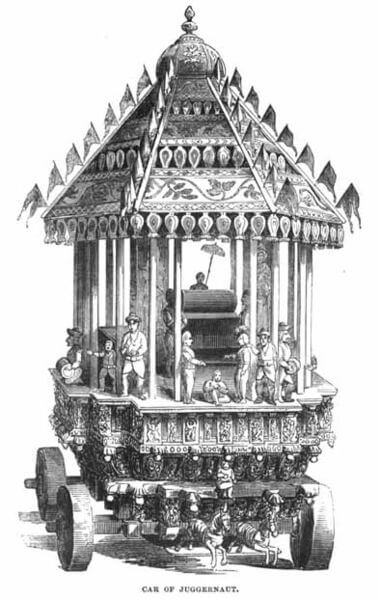Three-Letter Words: Don
 Some of the most perplexing words on the GRE are diminutive. Who doesn’t see PAN : REVIEW and metaphorically scratch his or her head, or wonder what, exactly, a nib or a gin is on its own? Welcome to Three-Letter Words. A few of them might make you want to deploy some four-letter words.
Some of the most perplexing words on the GRE are diminutive. Who doesn’t see PAN : REVIEW and metaphorically scratch his or her head, or wonder what, exactly, a nib or a gin is on its own? Welcome to Three-Letter Words. A few of them might make you want to deploy some four-letter words.
To don is to put on or dress in. You don your clothes every morning. (Well, I don’t know you personally, but unless you live in a nudist colony, I’m pretty sure you don clothes diurnally).
Try this GRE Analogies problem — choose your own answer before clicking “more”:
DON : DOFF ::
A. vie : vex
B. bilk : stymie
C. frighten : terrify
D. excise : insert
E. pan : win
The Amazing Story Behind “Juggernaut”
A juggernaut, according to Wikipedia, “is a term used in the English language to describe a literal or metaphorical force regarded as unstoppable. It is often applied to a large machine or collectively to a team or group of people working together, or a growing political movement led by a charismatic leader, and often bears association with crushing or being physically destructive.”
A few days ago, a post about Vocabulary in The Sound of Music discussed the word roué, a scoundrel so bad as to “deserve” the punishment of being “broken on the wheel,” a grotesque medieval death sentence that involved much breaking of limbs.
Today we have another wheel-based word: the original “juggernaut” was a giant chariot that carried statues of gods in a religious procession (“juggernaut” comes from the Sanskrit जगन्नाथ Jagannātha, “Lord of the Universe”, which is a name for Krishna). English colonials in India reported Hindus throwing themselves under the wheels of the chariot as a religious sacrifice. Others regard this story as an English invention, saying that “the deaths, if any, were accidental and caused by the crowd and commotion.”

The image above (“The Car of Juggernaut”) is from the 1851 Illustrated London Reading Book (by way of Wikipedia).
This Time magazine article from 1940 powerfully uses juggernaut in context:
A band of 135 Finnish war veterans”volunteer Swedes and Finns as well as Norwegians”stood a desperate six-hour siege [against invading Nazi forces]. They manned even an old muzzle-loading cannon, which recoiled 18 feet and had to be hauled back into place after every shot. Nazi shock troopers finally blasted them out with mortars and flame…. Elsewhere the Nazi juggernaut rolled comfortably from town to town, in its own lorries and commandeered busses.
A similar word is steamroller. Literally, a steamroller is a construction vehicle that flattens everything in its path. So, to steamroll or steamroller someone is to force that person to do or accept something, or it can be to pass a bill in government by crushing opposition.
Brand Name Vocab: Quotidian
If you live in New York, Los Angeles, or any of 24 other cities in 19 different countries, you may be familiar with the cafe chain Le Pain Quotidien. The name is French for “the daily bread.”

In English, quotidian (note the different spelling) means “daily, everyday, commonplace” and can have the negative connotation of “mundane, unexceptional.”
Choose your own answer to this GRE Antonyms problem before clicking “more.”
QUOTIDIAN :
A. diurnal
B. matutinal
C. sporadic
D. pedestrian
E. maudlin
Vocabulary in The Sound of Music
This song from The Sound of Music contains several GRE-worthy vocabulary words:
//www.youtube.com/watch?v=YL27-VldopA
This particular video is rather ineptly subtitled; here is a snippet of the real lyrics:
You are sixteen going on seventeen
Baby, it’s time to think
Better beware, be canny and careful
Baby, you’re on the brinkYou are sixteen going on seventeen
Fellows will fall in line
Eager young lads and roués and cads
Will offer you food and wineTotally unprepared are you
To face a world of men
Timid and shy and scared are you
Of things beyond your ken
The word canny is certainly related to uncanny, but the words are hardly antonyms. Uncanny means “mysterious, seemingly supernatural.” Here, Rolf is telling Liesl to be canny — that is, “careful, astute, prudent, shrewd.” See our post on sagacious for some synonyms.
One way to be canny is to stay away from roués and cads. If you have an American grandmother, she is well familiar with the word cad (“an ill-bred man, especially one who behaves in a dishonorable or irresponsible way toward women”) — several decades ago, a man who took you out on more than a handful of dates without proposing marriage could be considered a cad.
A roué is really quite a bit worse, though: “a lecherous dissipated man.” Roué comes from a French word for breaking a person on the wheel, a truly grotesque medieval punishment. The idea was, of course, that a roué deserved this punishment, which was considered to be reserved for criminals for whom a simple hanging was too merciful.
Finally, Liesel is supposedly “timid and shy and scared” of things beyond her ken. Ken means knowledge, understanding, or perception and often occurs as it is used in the song, in the idiom “beyond (someone’s) ken.” (“Ken” got an entire blog post here). Note that the subtitler in the video above has confused “ken” with “kin,” which means extended family.
Finally, while I know I may attract the ire of many ardent lovers of The Sound of Music, it must be said: this song is a little creepy.
“Your life, little girl, is an empty page that men will want to write on.”
The film came out in 1965 and, of course, was set in 1930’s Austria. While some people think of that era as more innocent, that song is a bit licentious, isn’t it?
Advocabulary: Hirsute is Not the Kind of Hair You Want
You know what’s not a good name for a hair salon?

Hirsute, which means hairy or shaggy and typically refers to body hair. Hirsutism is the medical condition of excessive growth of hair of normal or abnormal distribution, especially in women.

Above: Salma Hayek in Cirque du Freak: The Vampire’s Assistant.
A related word (and a very common word on the GRE) is raze, which is exactly what a razor does. Raze can mean “shave or scrape off,” but isn’t only about hair: you can raze a building by demolishing it or leveling it to the ground.
Try this GRE Analogies problem:
RAZE : HIRSUTE ::
A. galvanize : hard
B. macerate : solid
C. vulcanize : placid
D. desiccate : arid
E. extirpate : homogeneous
Advocabulary: Sundry
What can you buy at a sundry shop?

Oh, all kinds of stuff. Sundry means “various, diverse, miscellaneous” and often occurs in the (rather redundant) expression “various and sundry.” Dictionary.com gives another expression, “all and sundry,” which means “everyone, both collectively and individually.” A sundry shop would be a good place to get a Snapple, a newspaper, and a tin of shoeshine; the idea of sundries includes the idea that the items are of nominal value.
A related word is notions. A notion is usually a vague idea (“I had a notion about that, but I hadn’t really thought it through”), but can also refer to “small articles, as buttons, thread, ribbon, and other personal items, esp. such items displayed together for sale, as in a department store.”
Advocabulary: Daffy’s on Broadway
This display was seen in a window of the Financial District location of Daffy’s, a discount clothing retailer:

Pulchritude is an ugly-sounding word simply meaning “physical beauty.” Its provenance is the Latin pulchritÅ«dÅ, also meaning beauty. I was unable to find any other words in English using this root (that’s why it sounds so weird!), although I did discover, in an online gardening forum, that there is an Aeschynanthus pulcher that is also known as a “lipstick plant,” which makes a certain sort of sense.
Since we’re talking about beauty, now seems as fine a place as any to mention that, in India, the word “homely” means “domestic” (as in, a quality a traditionally-minded man would want in a traditionally-minded wife), but in U.S. English, homely means “plain, unattractive,” and is a somewhat less popular attribute in a romantic partner.
Just Google the phrase “homely wife,” and you’ll get lots of Indian matrimonial ads containing phrases that, in U.S. English, are oxymorons: “Professional male seeks beautiful and homely wife.”
Three-Letter Words: Gin
 Some of the most perplexing words on the GRE are diminutive. Who doesn’t see PAN : REVIEW and metaphorically scratch his or her head, or wonder what, exactly, a nib or a gin is on its own? Welcome to Three-Letter Words. A few of them might make you want to deploy some four-letter words.
Some of the most perplexing words on the GRE are diminutive. Who doesn’t see PAN : REVIEW and metaphorically scratch his or her head, or wonder what, exactly, a nib or a gin is on its own? Welcome to Three-Letter Words. A few of them might make you want to deploy some four-letter words.
Today’s word is gin? It is!
Gin is not only a liquor made from grain mash and juniper berries, but also a machine for separating the fibers of cotton from the seeds (like the “cotton gin” from history class), a trap or snare for hunting, or a machine for hoisting.
Here is a cotton gin on display at the Eli Whitney Museum:

Try the following Analogies question — choose your own answer before clicking “more.”
GIN : SEPARATING ::
A. vise : shrinking
B. awl : compiling
C. harrow : planting
D. winch : turning
E. combine : harvesting
Easily Confused Words: Impetus and Impetuous
impetus ≠impetuous
Impetus is a stimulus, impulse, or force that moves something else to action.
Impetuous means impulsive, rash, characterized by sudden action.
Seeing the Vin Diesel classic “XXX” was the impetus behind my decision to skydive.
My decision to jump out of an airplane after seeing an actor do so in a movie was a bit impetuous.
Pop Quiz: Positive or Negative?
 Pop Quiz!
Pop Quiz!
Because the GRE is a computer-adaptive test, chances are you’re going to see words you don’t know. When that happens, one useful strategy is to try to ferret out whether the unknown words have positive or negative connotations. You can do this using roots, your knowledge of similar words in English or Romance languages, or just your “gut” feeling.
Decide whether each word is positive, negative, or neutral, then click “more.”
MALAISE
DELETERIOUS
VARIEGATED
SPECIOUS
PULCHRITUDINOUS